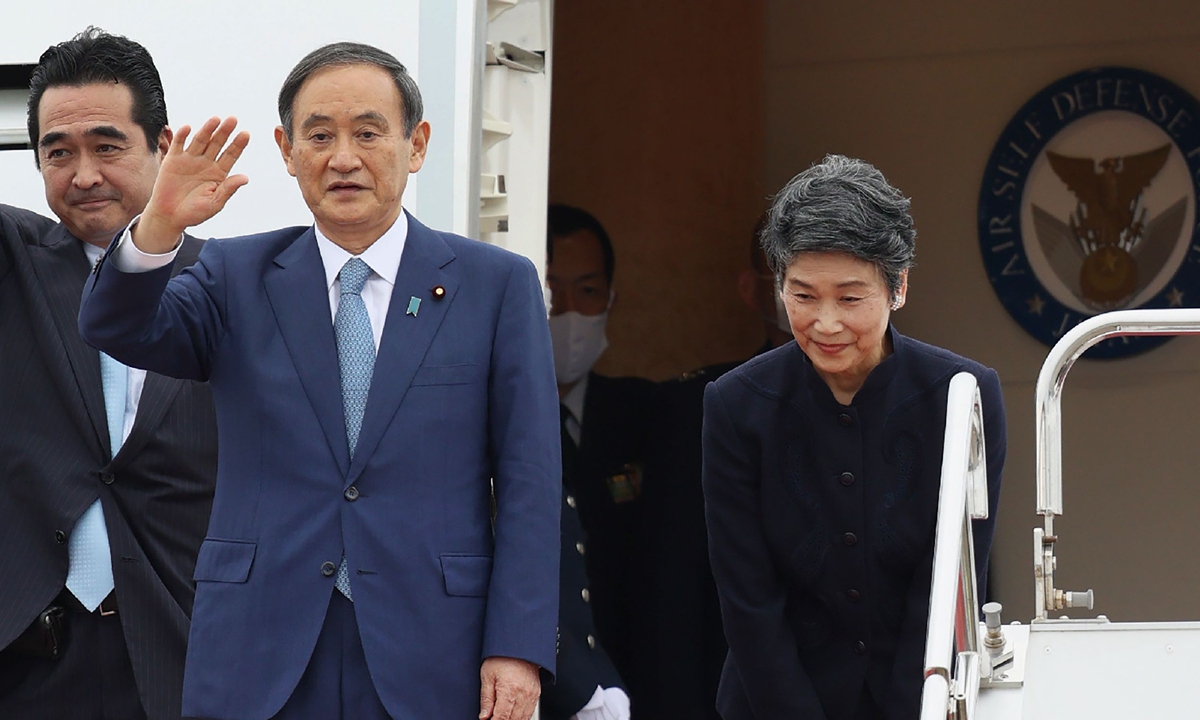Suga's SE Asia trip 'risk control'
By Xu Keyue Source: Global Times Published: 2020/10/19 18:57:06
Japan-Vietnam defense deal targeting China casts shadow over region

Japanese Prime Minister Yoshihide Suga (front) and his wife, Mariko (right), depart for a trip to Vietnam and Indonesia from Haneda Airport in Tokyo on Sunday. The trip is Suga's first overseas trip since taking office, as he looks to bolster ties with the Southeast Asian countries. Photo: VCG
During new Japanese Prime Minister Yoshihide Suga's first overseas trip after taking office to Vietnam and Indonesia, Suga agreed on Monday with his Vietnamese counterpart to step up security and economic ties, including an agreement in principle for Japan to send defense equipment to the Southeast Asian country, which Chinese experts said targets China and signals Japan's assistance to the US' Indo-Pacific Strategy.
Suga, whose predecessor Shinzo Abe also chose Vietnam as his first destination after taking office in 2013, kicked off the trip on Sunday.
Experts described the trip as a risk-control measure in attempt to balance pressure from the US and Japan's relationship with China, while warning China to keep a close watch on any agreements reached during the trip.
They said Suga has no better choice of a first destination amid the COVID-19 pandemic and worsening China-US ties.
Japanese media reported on Monday that Suga called Vietnam a "cornerstone" of efforts to realize a free and open Indo-Pacific, and vowed Japan's continued contribution to "peace and prosperity in the region" when he spoke to reporters after a summit with Vietnamese Prime Minister Nguyen Xuan Phuc.
Suga said the two countries had agreed in principle on transfers of defense equipment and technology, including patrol planes and radar equipment.
Analysts said the agreement can help Vietnam to enhance its surveillance capabilities in the South China Sea in response to China's military presence in the disputed waters.
The agreement signals that Japan has actively started to follow, assist and ensure the US' Indo-Pacific Strategy - not only in terms of politics but also military affairs - to contain China's influence in Southeast Asia.
Da Zhigang, director and research fellow of the Institute of Northeast Asian Studies at the Heilongjiang Provincial Academy of Social Sciences and chief expert at the Northeast Asian Strategic Studies Institute, told the Global Times on Monday that the defense agreement would cast a shadow over regional stability and peace, especially over the South China Sea disputes.
Da worried that such a defense deal could increase the difficulty to achieve multilateral consensus over the South China Sea disputes.
The military cooperation between Japan and Vietnam has been long-standing, but this time it went further, which would exert a subtle influence on relations between China and Japan, Da said.
The defense deal with Vietnam apparently exposed Japan's trick, which is to attract more countries to meddle in the South China Sea issues, thus containing China, Da noted.
Liu Junhong, a research fellow at the China Institutes of Contemporary International Relations, said as maritime energy security is Japan's "sea lifeline," Southeast Asia has always been its focus on diplomacy.
Also, amid the escalating pandemic especially in the US, Europe, India and Russia, Suga has no other better choice for his first oversea trip. Considering the result of the US presidential election is still unknown, it would not have been good for Suga to meet US President Donald Trump as his diplomatic debut, said Liu. China was not Suga's choice, however, under pressure from the US, Liu noted.
Considering the result of the US presidential election is still unknown, it would not have been good for Suga to meet US President Donald Trump as his diplomatic debut, said Liu. China was not Suga's choice, however, under pressure from the US, Liu noted.
Although the defense agreement has been reached in principle, which is in line with Japan's national interests for the security, Suga's administration is not likely to easily and publicly take sides and provoke China on the basis of its risk-aversion policy, Liu noted.
Japan can improve its relations with Southeast Asian countries through diplomatic etiquette, but cannot replace China's position in ASEAN in the context of the current epidemic and economic conditions, Da said.
However, Japan would collude with its alliance of the US, India and Australia, such as strengthening relations with Southeast Asian countries, and seeking chips in the game to suppress China in the region, said the analysts.
Analysts noted that Suga's trip also could be seen as practice of the consensus reached during the Quadrilateral Security Dialogue among the US, Japan, India and Australia in Tokyo in early October.
During the group's first in-person meeting since the COVID-19 outbreak, the foreign ministers of the four countries reiterated their firm support for ASEAN and the ASEAN-led regional framework. They also threw their full support behind ASEAN's "Outlook on the Indo-Pacific."
Posted in: DIPLOMACY